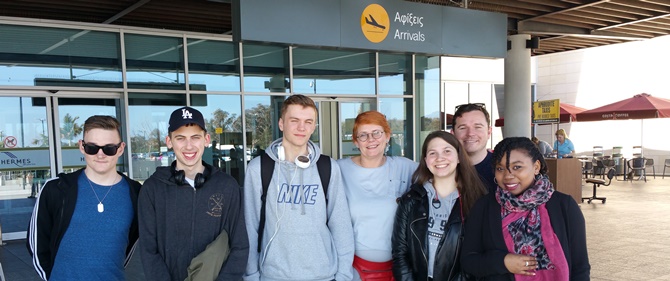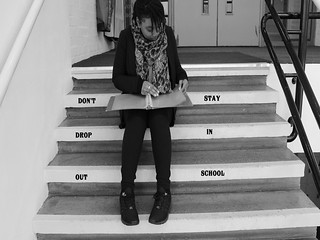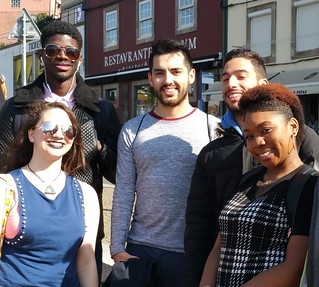
How an Erasmus+ Strategic Partnership helped London college tackle dropout problem
Shooters Hill Sixth Form College is in the Royal Borough of Greenwich - an area of London with one of the worst student dropout rates in the UK.
In seeking ways to tackle this complex problem - which can involve personal, social, economic, education or family-related issues - the college became part of an Erasmus+ Strategic Partnership initiative.
With the help of eTwinning, a European Union online partner-finding platform, Shooters Hill joined a group of schools from Turkey, the lead partner, Bulgaria, Italy, Portugal, Cyprus, Greece, Norway, Latvia and Lithuania as well as the UK in the ‘High School Dropout: One is Too Many’ project, set up to address early school leaving (ESL) at grass roots level.
Reducing the average rate of early school leavers to less than 10% by 2020 is one of the headline education targets of the European Union’s Europe 2020 strategy.

Supportive environment
Andrew James, Head of Training and co-ordinator of Computing & ICT at Shooters Hill - a large mixed further education college, explained: “Investment in the educational achievement of young people is essential for their employment prospects. Reducing ESL can help towards the integration of young people into the labour market and contribute to breaking the cycle of deprivation that leads to the social exclusion of too many young people.
“Our main objective was to find new methods for increasing motivation and creating a more supportive school environment to decrease the number of student dropouts. Our school was one of those with the highest dropout rate among our partner countries, so we wanted to learn best practice from our partners to try to reduce this. We also wanted to find new ways to shape our college ethos and strategic vision.
We’ve seen an immediate increase in attendance and punctuality as well as successful outcomes for those who have taken part.
"We focused on students with fewer opportunities, who felt somehow isolated from the school community, in order to provide them with the motivation they were lacking. We also wanted to encourage greater parental involvement in school activities in order to build stronger relationships and provide an opportunity for teachers to give guidance about methods to help these ‘at-risk’ students.
"Our school serves as an example of improved practice, having developed extensive strategies to prevent dropouts in our department; rising from one of the lowest achieving departments to the second highest across the three years of the project.
Project activities
“We started by exchanging information, coming together in transnational meetings to share and analyse best-practice models, and then went on to compare and adapt them to each partner’s own activities and environment in order to improve our educational settings and, therefore, reduce ESL. We wanted our students to feel comfortable and supported, have ownership of their own learning and feel able to engage with their studies and the school; vital for the emotional, social and educational development of our learners, and the overall governance of our institution.”
 The group also took part in short-term exchanges and organised three annual trips for learners to travel and work with their counterparts across Europe. Other activities included student trips to universities around the UK, the formation of the student and teacher group and the creation of an ‘Erasmus+ corner’ to share their experiences with the whole school.
The group also took part in short-term exchanges and organised three annual trips for learners to travel and work with their counterparts across Europe. Other activities included student trips to universities around the UK, the formation of the student and teacher group and the creation of an ‘Erasmus+ corner’ to share their experiences with the whole school.
They entered a competition where students created a project poster and a photography competition, both of which they won. They also arranged social gatherings at school where parents, teachers and students spent quality time together, organised careers and apprenticeship fairs and even held sports days where students and teachers competed with each other. Andrew considers this to be one of their most successful activities with all students participating in a variety of enrichment activities from swimming to creative writing, getting involved and enjoying spending time with each other.
Successful outcomes
The students themselves have said that their perception of education has changed, says Andrew.
“The activities have brought them all together, taught them the value of teamwork and to be more accepting of others. It particularly helped those students of low prior attainment who were very demotivated as a result of previous experience in education. Our project gave them the chance to feel a part of a bigger group, and has created a friendly, inclusive and caring atmosphere at college. Our students have also learnt new skills and discovered new interests, such as photography and developing posters using desktop publishing software, creative writing and sports.”
"We’ve seen an immediate increase in attendance and punctuality as well as successful outcomes for those who have taken part, particularly those who took part in the student mobility visits, and we have seen a direct link to improved attendance overall," said school head, Jan Atkinson.
Andrew believes that this three-year Erasmus+ project will have a long-term effect, not only on the pupils but on the wider community and even the local economy.
“Our dropout rates have significantly reduced and all our key target groups have benefitted tremendously," he says. "Students with difficulties, who previously didn't have opportunities to interact with other students, became engaged. Teachers, who used to feel that they only served as an educator, now see themselves as role models. Even parents have felt the impact, choosing to stand by the college to help their children achieve their goals in both academic and social contexts.”
Could your school benefit from a Strategic Partnership? Find out more about Erasmus+ schools funding now.
